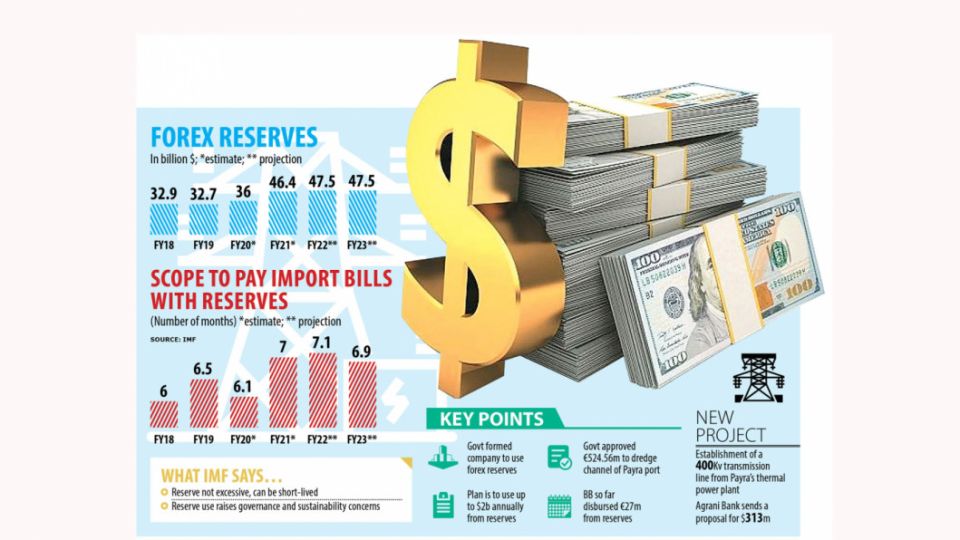January 21, 2022
DHAKAR – The government plans to use the country’s foreign currency reserves to implement a $370.96 million power transmission project, ignoring warning from the International Monetary Fund (IMF).
State-run Agrani Bank has sent a proposal of North-West Power Generation Company Ltd (NWPGCL), a government-owned entity, to the Bangladesh Bank.
For all latest news, follow The Daily Star’s Google News channel.
Under the proposal, the power company is seeking $313 million for the second transmission line project from Payra. The financing will be arranged by Agrani Bank.
Bangladesh-China Power Company, a joint venture of NWPGCL and China National Machinery Import and Export Corporation, will build a 400Kv double circuit transmission line, which will connect Payra, Gopalganj and Dhaka’s Aminbazar to supply electricity from Payra’s thermal power plant and potential future power plants.
The government is looking to turn Payra a major power generation hub. But the electricity to be produced at the hub can’t be supplied to other parts of the country on the basis of the existing transmission lines, said a Power Division official.
But the plan to use the foreign currency reserves comes amid warning from the IMF against using it for such projects.
“The decision to use the FX reserve windfall to finance “crucial” infrastructure projects through the newly created Bangladesh Infrastructure Development Fund (BIDF) raises governance and external sustainability concerns,” said the IMF.
It made the observations in a report submitted to the government after an IMF team visited Bangladesh from December 5 to December 19 last year.
In its first, the government approved to use 524.56 million euros from the reserves for a development project in March last year for the dredging of a channel for Payra Port, a seaport in Kalapara, Patuakhali.
The BB has so far disbursed 27 million euros for the project.
The BIDF was formed to make lending from the reserves to development projects. The annual investment target from the fund would be no more than $2 billion, according to finance ministry documents.
The BB has committed to financing the BIDF using the reserves for up to $2 billion per year for the next five years, on the condition that the reserves cover import payments for at least six months, project earnings are in foreign currencies, and a sovereign guarantee is provided.
The IMF said foreign currency reserves in Bangladesh are adequate and not excessive, and the recent peak in reserves is expected to be short-lived.
“Ad-hoc use of FX reserves could undermine fiscal discipline by exposing the public sector to large contingent liabilities and fiscal risks.”
Zaid Bakht, chairman of Agrani Bank and a noted economist, says every central bank makes some investment in safe areas after analysing risks so that money doesn’t sit idle.
“From that point of view, if there is a public sector project and if there is a guarantee from the government, then I don’t see any problem.”
The former research director of the Bangladesh Institute of Development Studies says a proposal from NWPGCL has been sent but it has not been approved yet.
“It is under discussion.”
Earlier, the private sector sent proposals to the BB seeking investment from the reserves, but the central bank did not pay any heed to them.
Ahsan H Mansur, executive director of the Policy Research Institute of Bangladesh, an independent think-tank, says the standard international practice is that a country can lend from the reserves, but the disbursed amount should no longer be counted as part of the reserves.
“But we are considering it as part of the reserves. As a result, our reserves are being artificially inflated,” he said, adding that the disbursed amount should be deducted while calculating the reserves.
The current reserves of Bangladesh are $44.99 billion, down from $46.39 billion in June.
Reserves may decline over the medium term due to expected normalisation in remittance inflows, no substantial pick-up in foreign direct investment, an increase in imports, and the limited exchange rate flexibility, according to the IMF.
The IMF’s warning is pertinent and many countries are struggling for a lack of adequate reserves.
Turkey is an example of how foreign reserves can drastically deplete. Its net international reserves fell below $8 billion on January 12, in comparison to $41.13 billion in 2019.
This led the country to sign a $4.9 billion currency swap agreement with the United Arab Emirates, Qatar, South Korea and China to prop up reserves.
Sri Lanka’s official reserves stood at a meagre $3.1 billion at the end of December. It also struck currency swap deals with India and Bangladesh.
Pakistan’s foreign exchange reserves fell to $17.6 billion in the week ending January 7.

